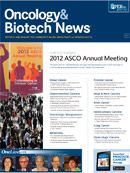Maintenance Erlotinib Fails to Improve Survival in Ovarian Cancer
Erlotinib given as a maintenance therapy did not improve PFS or OS in patients with epithelial ovarian cancer who had received first-line platinum-based chemotherapy.
Erlotinib is depicted in a ball-and-stick figure amid the gray surface of the epidermal growth factor tyrosine kinase domain.
Erlotinib given as a maintenance therapy did not improve progression-free survival (PFS) or overall survival (OS) in patients with epithelial ovarian cancer who had received first-line platinum-based chemotherapy, according to the results of a phase III study presented at ASCO 2012.
Erlotinib is a tyrosine kinase inhibitor that targets EGFR. The drug has been approved to treat non—small cell lung cancer and pancreatic cancer, but since EGFR is overexpressed in many cases of epithelial ovarian cancer, researchers believed that it could potentially be used to treat that particular tumor type as well. A phase II study published in 2005 found that 44% of patients with epithelial ovarian cancer treated with erlotinib achieved stable disease (Int J Gynecol Cancer. 2005;15[5]:785-792).
In the randomized phase III trial presented at ASCO, 835 patients with high-risk FIGO stage I or stage II-IV epithelial ovarian, peritoneal, or fallopian tube cancer who had undergone 6 to 9 cycles of first-line, platinum-based chemotherapy and showed no signs of progression were randomized to either maintenance erlotinib at a dose of 150 mg daily for 2 years or observation. Patients were not selected based on EGFR expression. The primary endpoint was PFS by RECIST criteria in combination with GCIG CA125 criteria.
After a median follow-up of 51 months, the researchers found that that the rates of PFS and OS were not statistically different among the study populations. The median PFS in the erlotinib arm was 12.7 months, compared with 12.4 months in the control arm (hazard ratio [HR] = 1.05; 95% CI, 0.90-1.23, P = .525). The median OS was 50.8 months in the erlotinib arm, compared with 59.1 months in the control arm (HR = .99; 95% CI, 0.81-1.20; P = .903).
The researchers further analyzed the data to determine if any subgroups benefited from erlotinib. FIGO stage, age, and response at the end of first-line chemotherapy all had no impact on survival. However, an analysis of EGFR-related mutations showed a trend toward better prognosis with erlotinib, though the proportion of these patients was relatively small, with only 8% of patients in the erlotinib arm and 9% of patients in the control arm expressing either EGFR, KRAS, NRAS, BRAF, or PI3KCA mutations. Due to the small sample size, statistical significance could not be found.
“
At this moment, we cannot identify a subgroup that might benefit from erlotinib maintenance therapy after first-line chemotherapy for ovarian cancer.”
—Ignace B. Vergote, MD, PhD
“At this moment, we cannot identify a subgroup that might benefit from erlotinib maintenance therapy after first-line chemotherapy for ovarian cancer,” Ignace B. Vergote, MD, PhD, head of the Department of Obstetrics and Gynecology and Gynecologic Oncology at the University Hospital Leuven and Catholic University in Leuven, Belgium, and lead author of the study, said in a presentation at ASCO.
Ignace said that the researchers are continuing to look at immunohistochemistry and fluorescence in situ hybridization analyses to determine a subgroup of ovarian cancer patients that may benefit from erlotinib.
Vergote IB, Joly F, Katsaros D, et al. Randomized phase III study of erlotinib versus observation in patients with no evidence of disease progression after first-line platin-based chemotherapy for ovarian carcinoma: A GCIG and EORTC-GCG study. J Clin Oncol. 2012;30(suppl; abstr LBA5000).




